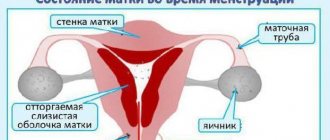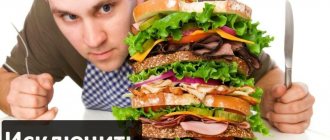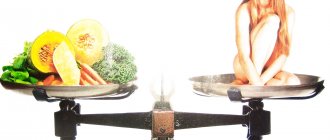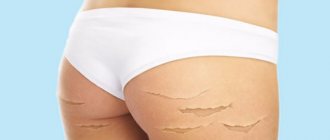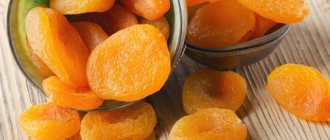“Space diet” by Sergei Sivokho: without denying himself anything, the comedian lost 42 kg in 3 months
Dieting during menstruation is an effective way to lose excess weight, since during this period the woman’s body naturally cleanses and renews itself, which means natural weight loss. You need to eat well so that the weight loss process occurs smoothly and without harm to your health. If you lose your period while losing weight, you should immediately consult a doctor.
General rules
A woman’s hormonal background changes throughout the cycle and affects her mood, general condition, performance and appearance. Due to the influence of hormones (in particular, progesterone in the second half of the cycle, starting from days 15-16), a natural reaction occurs before menstruation - fluid retention, which causes weight gain and swelling of the face, arms and abdomen.
On average, weight fluctuations are 2-3 kg. Don't be upset - these are not extra pounds due to fat deposits, but fluid that will go away with the end of your period. On the eve of critical days, irritability appears, many note a strong craving for sweets and an increase in appetite. The body tries to stock up on nutrients for future use. If you do not control your appetite, carbohydrates will be stored “in reserve” in the form of fat. A possible cause of sweet cravings is low blood sugar due to skipping meals. Therefore, you need to eat small portions and often - up to 6 times a day.
All effects of progesterone will be expressed before the start of the next cycle. At this time, the woman experiences premenstrual tension syndrome , which includes, in addition to the symptoms described above, bloating, drowsiness , lethargy and soreness of the mammary glands.
A diet for PMS will help correct this condition. A week before your period, it is recommended:
- limit the amount of salt, salty foods (soy sauce, salted fish, herring, salted nuts, cheeses, sausages, pickles and marinades);
- use caution with caffeine-containing drinks and alcohol, which retain water and further increase swelling;
- include a decoction of diuretic herbs in the diet: dill, parsley, horsetail, corn silk, celery stalks.
Already a week before the start of your period, you need to eat food rich in fiber and complex carbohydrates (cabbage, apples, cereals, legumes, bran, whole grain bread, seeds and sunflower seeds). Fiber helps remove water from the body. It has been noticed that seafood helps fight chocolate cravings. This is an ideal nutrition option during this period - it contains few calories and sufficient amounts of protein, iron and zinc.
Do I need a diet during menstruation to lose weight? Directly during menstruation, special nutrition for the purpose of losing weight is contraindicated. It must be said that this is not the best time to diet. This will only worsen depression and be stressful for the body.
These days there is a decrease in the level of estrogen , a hormone necessary for the production of serotonin (the mood hormone). Therefore, many women are prone to depression or at least depressed mood. This also explains the craving for sweets, especially chocolate. Nutritionists advise sticking to a medium-calorie diet during this period, and not going on fasting days or strict diets.
Taking into account the hormonal changes during your period, it becomes clear why attempts to lose weight are futile. Weight gain depends on progesterone, the level of which increases before menstruation. This hormone prepares the female body for pregnancy and promotes the accumulation of fat deposits. But this process can be influenced by adhering to proper nutrition.
Nutrition during menstruation should be rational and healthy. The beginning of the cycle is associated with discomfort, and for many women with painful sensations. During the first days, it is advisable to consume only complex carbohydrates that are slowly absorbed by the body: whole grain bread, cereals (especially rice and buckwheat), legumes, various vegetables and fruits.
Give up “bad” carbohydrates (sweets, cakes, pastries, sweet pastries, cookies) and replace them with fruits and berries, honey, dried fruits, cereals with added honey and dried fruits. Include dried apricots, prunes, raisins, dried pears in your diet - they are quite sweet due to their fructose content and, in combination with cottage cheese or yogurt, can easily replace desserts. These products will help improve your mood, provide vitamins and energy, and at the same time there will be less risk of gaining extra centimeters and kilograms.
During this period, it is better to exclude extractive and central nervous system stimulating substances and dishes:
- coffee Tea;
- strong meat broths, fried and stewed meats;
- chocolate.
Including magnesium-rich foods in your diet will help overcome irritability and headaches. We get magnesium by eating cereals, nuts, bran, seeds, dark green vegetables, peas and beans, buckwheat and millet groats. Nuts and seeds (flax, sunflower, pumpkin, poppy, sesame) can be a healthy snack at work when you feel hungry. They also contain vitamin E, which regulates the production of serotonin and has a beneficial effect on the reproductive system. Therefore, additionally include vegetable oils and soybeans in your diet.
Potassium regulates water-salt metabolism and promotes the removal of fluid from the body, and this is very important during this period; it also prevents the occurrence of depression. All nuts, dried apricots, raisins, prunes, bananas, cabbage, and leafy vegetables contain a lot of potassium.
In the middle of the cycle (8-14 days), you can add more calories and include protein foods: seafood, fish and meat dishes, eggs, more cottage cheese. Carbohydrates should be reduced. The calorie content of food should be 1400 kcal.
At the end of the cycle (days 15-28), you can add sweet foods, but avoid eating heavy foods. As before, vegetables and fish should predominate in the diet.
If you have painful periods, you should include in your diet:
- bananas and chocolate;
- vitamins and minerals (they help reduce the tone of the uterus);
- drink wine with orange juice at night;
- give up coffee, salt and salty foods.
You can maintain your iron levels by eating:
- red meat;
- oysters, squid, shrimp;
- caviar, red fish;
- whole buckwheat porridge;
- apples, lettuce, prunes, dried apricots, raisins;
- broccoli and kohlrabi;
- liver (veal, beef, chicken);
- pomegranate juice.
Many women are bothered by bloating. In this case, you need to temporarily avoid cabbage, yeast bread, potatoes, bananas, legumes, grapes, carbonated drinks, and kvass. Herbal teas can help reduce pain. You can drink tea consisting of 1 teaspoon mint and 2 teaspoons green tea, nettle infusion.
High-intensity training is also not recommended during this period. From the fourth day of menstruation, you can do your usual exercise in the gym, since from the 4th to the 25th day of the cycle, women can easily tolerate all kinds of physical activity.
You can start a low-calorie diet immediately after the end of your period - during this period, your appetite decreases and you can complete the nutrition you have planned to the end without stressing the body. A favorable time to start a diet is the period of estrogen influence, the level of which increases every day after the end of menstruation until the 14-15th day of the cycle. This hormone helps the body burn fat, improves mood and suppresses appetite. At this time, a woman is in a good mood, she is motivated and confident, and her body can easily accept changes, particularly in nutrition.
Is it possible to fast during menstruation?
Medicine is not against fasting, which is used to treat severe allergies , psoriasis , eczema , bronchial asthma and other diseases. As for fasting during menstruation, opinions are divided. Periodic bleeding is not a contraindication, but some believe that it is still not worth starting it during this period. If you are already in the process of fasting, then there is no need to interrupt it during your period.
Another opinion is based on the fact that fasting, especially for 2-5 days, should be timed to coincide with the beginning of menstruation. The end of them indicates the renewal of the woman’s body, the need for food, and the need to get out of hunger. If long-term fasting is undertaken (7-30 days), then the exit from it should also be timed to coincide with the end of menstruation.
You need to know that fasting can cause disruption of the menstrual cycle - it becomes erratic or periods may be completely absent. The cycle will have to be restored with hormonal drugs, which poses the risk of weight gain if fasting is undertaken for this purpose. Remember that prolonged fasting at home is dangerous due to all sorts of complications (vomiting, convulsions, increased blood pressure), and it is also impossible to take appropriate measures to remove ketone bodies and reduce intoxication .
Also, many people note that after the diet there are no periods. An unbalanced low-calorie diet (at the level of 1000-1200 kcal) and limited intake of proteins, fats and carbohydrates causes hormonal disorders. The reproductive system is especially sensitive and, against the background of significant weight loss, an imbalance of sex hormones develops. Long-term absence of menstruation leads to irreversible changes ( infertility ).
What are heavy periods?
Heavy periods are called menorrhagia (sometimes called hypermenorrhea). This is a pathological form of menstrual flow, when bleeding, although regular at intervals, is so heavy and/or prolonged that women lose a lot of blood. If menstruation lasts more than 7 days and more than 150 ml of blood is released during it, this affects the general condition of the body, and the underlying causes of the disorder often require elimination.
Medical statistics claim that every third woman, at least once in her life, turns to a specialized specialist with relevant complaints. Heavy periods are unlikely to go unnoticed. Often they take on such a form that they affect a woman’s life during menstruation. Pads have to be changed hourly, and menstruation itself is accompanied by cramping or aching pain, which significantly complicates the normal course of daily activities.
Heavy periods are considered normal if they are observed in the first days of menstruation (1-2 days), and then tamed, gradually fading to nothing. If excessive discharge is observed during the week, for example, blood is released in clots, a woman is forced to wake up at night to replace the hygiene product, and also take time off from work, this is a good reason to consult a doctor.
Despite the fact that menorrhagia rarely goes unnoticed by a woman, it is not accompanied by any special subjective sensations. Often, such a disorder differs slightly from the average menstrual discharge - it is more or less painful (these are cramping or nagging pains in the lower abdomen and sacral spine), clots are present in the discharge, dizziness and nausea may develop, and extremely rarely the condition is complicated by fainting attacks.
Authorized Products
- Vegetables and fruits contain antioxidants , which to some extent reduce the pain symptom. They have a positive effect on digestion and improve intestinal motility, preventing constipation . Among fruits, preference should be given to bananas, apples, and apricots, as they contain potassium, iron and magnesium. The composition of vegetables is any, but broccoli contains folic acid and calcium, eggplants contain potassium and magnesium, and lentils should be chosen as a high-protein product.
- Rye bread, with bran, whole grain.
- It is better to cook soups with weak and low-fat broths. There is a wide choice of them according to your preferences: vegetable, mushroom, borscht, rassolnik, cabbage soup, beetroot soup.
- Any fish and seafood. They contain a sufficient amount of iodine and vitamin D , which is necessary for the absorption of calcium. Fatty acids relieve pain to some extent.
- Be sure to include fermented milk products, cottage cheese, cheese and milk in your diet (if tolerated). Calcium and vitamins are necessary to restore the body during this period.
- It is better to choose low-fat varieties of meat and poultry. Their proteins, amino acids and iron will be beneficial during your period, especially red meat, which contains more iron. The liver is also useful in this regard.
- Eggs in any preparation.
- Various cereals (preferably whole grains), legumes are included if well tolerated.
- Introduce various vegetable oils into your diet - a source of vitamin E and unsaturated fatty acids.
- Nuts and seeds are sources of vitamins, microelements, and fatty acids.
- Recommended drinks include green tea, rosehip infusion, and herbal infusions, which were mentioned above.
Table of permitted products
| Proteins, g | Fats, g | Carbohydrates, g | Calories, kcal | |
Vegetables and greens | ||||
| vegetables legumes | 9,1 | 1,6 | 27,0 | 168 |
| zucchini | 0,6 | 0,3 | 4,6 | 24 |
| cabbage | 1,8 | 0,1 | 4,7 | 27 |
| cauliflower | 2,5 | 0,3 | 5,4 | 30 |
| carrot | 1,3 | 0,1 | 6,9 | 32 |
| cucumbers | 0,8 | 0,1 | 2,8 | 15 |
| beet | 1,5 | 0,1 | 8,8 | 40 |
| pumpkin | 1,3 | 0,3 | 7,7 | 28 |
Fruits | ||||
| apricots | 0,9 | 0,1 | 10,8 | 41 |
| oranges | 0,9 | 0,2 | 8,1 | 36 |
| watermelon | 0,6 | 0,1 | 5,8 | 25 |
| bananas | 1,5 | 0,2 | 21,8 | 95 |
| pears | 0,4 | 0,3 | 10,9 | 42 |
| melon | 0,6 | 0,3 | 7,4 | 33 |
| lime | 0,9 | 0,1 | 3,0 | 16 |
| lemons | 0,9 | 0,1 | 3,0 | 16 |
| tangerines | 0,8 | 0,2 | 7,5 | 33 |
| plums | 0,8 | 0,3 | 9,6 | 42 |
| apples | 0,4 | 0,4 | 9,8 | 47 |
Berries | ||||
| strawberry | 0,8 | 0,4 | 7,5 | 41 |
| sea buckthorn | 1,2 | 5,4 | 5,7 | 82 |
| currant | 1,0 | 0,4 | 7,5 | 43 |
| rose hip | 1,6 | 0,0 | 14,0 | 51 |
Mushrooms | ||||
| mushrooms | 3,5 | 2,0 | 2,5 | 30 |
Nuts and dried fruits | ||||
| raisin | 2,9 | 0,6 | 66,0 | 264 |
| dried apricots | 5,2 | 0,3 | 51,0 | 215 |
| sunflower seeds | 20,7 | 52,9 | 3,4 | 578 |
| pumpkin seeds | 24,5 | 45,8 | 4,7 | 556 |
| dates | 2,5 | 0,5 | 69,2 | 274 |
| prunes | 2,3 | 0,7 | 57,5 | 231 |
Cereals and porridges | ||||
| buckwheat (kernel) | 12,6 | 3,3 | 62,1 | 313 |
| cereals | 11,9 | 7,2 | 69,3 | 366 |
| corn grits | 8,3 | 1,2 | 75,0 | 337 |
| pearl barley | 9,3 | 1,1 | 73,7 | 320 |
| millet cereal | 11,5 | 3,3 | 69,3 | 348 |
| brown rice | 6,3 | 4,4 | 65,1 | 331 |
| barley grits | 10,4 | 1,3 | 66,3 | 324 |
Bakery products | ||||
| Rye bread | 6,6 | 1,2 | 34,2 | 165 |
| bran bread | 7,5 | 1,3 | 45,2 | 227 |
Raw materials and seasonings | ||||
| honey | 0,8 | 0,0 | 81,5 | 329 |
| sour cream sauce | 1,9 | 5,7 | 5,2 | 78 |
Dairy | ||||
| milk | 3,2 | 3,6 | 4,8 | 64 |
| kefir | 3,4 | 2,0 | 4,7 | 51 |
| curdled milk | 2,9 | 2,5 | 4,1 | 53 |
| acidophilus | 2,8 | 3,2 | 3,8 | 57 |
| yogurt | 4,3 | 2,0 | 6,2 | 60 |
Cheeses and cottage cheese | ||||
| cheese | 24,1 | 29,5 | 0,3 | 363 |
| cottage cheese | 17,2 | 5,0 | 1,8 | 121 |
Meat products | ||||
| beef | 18,9 | 19,4 | 0,0 | 187 |
| veal | 19,7 | 1,2 | 0,0 | 90 |
| rabbit | 21,0 | 8,0 | 0,0 | 156 |
Bird | ||||
| chicken | 16,0 | 14,0 | 0,0 | 190 |
| turkey | 19,2 | 0,7 | 0,0 | 84 |
Eggs | ||||
| chicken eggs | 12,7 | 10,9 | 0,7 | 157 |
Fish and seafood | ||||
| canned fish | 17,5 | 2,0 | 0,0 | 88 |
Oils and fats | ||||
| butter | 0,5 | 82,5 | 0,8 | 748 |
| corn oil | 0,0 | 99,9 | 0,0 | 899 |
| olive oil | 0,0 | 99,8 | 0,0 | 898 |
| sunflower oil | 0,0 | 99,9 | 0,0 | 899 |
Non-alcoholic drinks | ||||
| mineral water | 0,0 | 0,0 | 0,0 | – |
| lingonberry juice | 0,1 | 0,0 | 10,7 | 41 |
| green tea | 0,0 | 0,0 | 0,0 | – |
Juices and compotes | ||||
| compote | 0,5 | 0,0 | 19,5 | 81 |
| apricot juice | 0,9 | 0,1 | 9,0 | 38 |
| carrot juice | 1,1 | 0,1 | 6,4 | 28 |
| tomato juice | 1,1 | 0,2 | 3,8 | 21 |
| pumpkin juice | 0,0 | 0,0 | 9,0 | 38 |
| rose hip juice | 0,1 | 0,0 | 17,6 | 70 |
| * data is per 100 g of product | ||||
Professional treatment for heavy periods
Specific medical procedures and drug therapy will be prescribed to a woman if the examination shows the presence of a functional disorder, gynecological disease, hormonal imbalance, iron deficiency anemia and other blood diseases.
Treatment of menorrhagia is aimed not at eliminating abnormal discharge, but at neutralizing the factors that cause menorrhagia. After a specialized diagnosis, having established the cause of the disorder, the doctor prescribes therapy in each specific case.
In addition, menorrhagia may be a reason for surgery. It is usually indicated for mature women with:
- recurrent course of hypermenorrhea;
- damage to the genital organs, leading to the development of heavy periods;
- lack of effect from drug therapy for menorrhagia.
If surgical treatment is used, it consists of two types of operations - hysteroscopy and hysterectomy. Hysteroscopy has already been mentioned, but it is used not only for diagnostic purposes. By introducing an ultra-thin probe into the uterine cavity, it is possible not only to detect, but also to remove some defects on its surface. A hysterectomy is the removal of the uterus through a small incision in the abdomen or through the vagina. This is the most radical way to normalize the menstrual cycle.
Before resorting to such methods of solving the problem, discuss conservative ways to normalize your cycle with your doctor.
Fully or partially limited products
- Sweets, pastries, flour products, cakes, pastries.
- Fatty concentrated broths, fatty meat and poultry.
- Margarine and refractory fats.
- Alcohol.
- Smoked meats, fatty cheeses, sausages, canned food, fast food.
- Salt is limited.
Table of prohibited products
| Proteins, g | Fats, g | Carbohydrates, g | Calories, kcal | |
Vegetables and greens | ||||
| canned vegetables | 1,5 | 0,2 | 5,5 | 30 |
| canned cucumbers | 2,8 | 0,0 | 1,3 | 16 |
| canned tomatoes | 1,1 | 0,1 | 3,5 | 20 |
| horseradish | 3,2 | 0,4 | 10,5 | 56 |
Berries | ||||
| grape | 0,6 | 0,2 | 16,8 | 65 |
Bakery products | ||||
| bagels | 16,0 | 1,0 | 70,0 | 336 |
| buns | 7,2 | 6,2 | 51,0 | 317 |
| butter horns | 8,3 | 12,1 | 50,5 | 345 |
| drying poppy seeds | 11,3 | 4,4 | 70,5 | 372 |
Confectionery | ||||
| jam | 0,3 | 0,2 | 63,0 | 263 |
| jam | 0,3 | 0,1 | 56,0 | 238 |
| jelly | 2,7 | 0,0 | 17,9 | 79 |
| pastry cream | 0,2 | 26,0 | 16,5 | 300 |
| fruit and berry marmalade | 0,4 | 0,0 | 76,6 | 293 |
| Kurabye cookies | 6,7 | 25,8 | 64,6 | 516 |
| oatmeal cookies | 6,5 | 14,4 | 71,8 | 437 |
| cake | 3,8 | 22,6 | 47,0 | 397 |
Cakes | ||||
| cake | 4,4 | 23,4 | 45,2 | 407 |
Chocolate | ||||
| chocolate | 5,4 | 35,3 | 56,5 | 544 |
Raw materials and seasonings | ||||
| mustard | 5,7 | 6,4 | 22,0 | 162 |
| ketchup | 1,8 | 1,0 | 22,2 | 93 |
| mayonnaise | 2,4 | 67,0 | 3,9 | 627 |
| ground black pepper | 10,4 | 3,3 | 38,7 | 251 |
| sugar | 0,0 | 0,0 | 99,7 | 398 |
| vinegar | 0,0 | 0,0 | 5,0 | 20 |
Dairy | ||||
| cream | 2,8 | 20,0 | 3,7 | 205 |
| sour cream | 2,8 | 20,0 | 3,2 | 206 |
Meat products | ||||
| pork | 16,0 | 21,6 | 0,0 | 259 |
Bird | ||||
| smoked chicken | 27,5 | 8,2 | 0,0 | 184 |
| duck | 16,5 | 61,2 | 0,0 | 346 |
| smoked duck | 19,0 | 28,4 | 0,0 | 337 |
| goose | 16,1 | 33,3 | 0,0 | 364 |
Fish and seafood | ||||
| smoked fish | 26,8 | 9,9 | 0,0 | 196 |
Oils and fats | ||||
| creamy margarine | 0,5 | 82,0 | 0,0 | 745 |
| animal fat | 0,0 | 99,7 | 0,0 | 897 |
| cooking fat | 0,0 | 99,7 | 0,0 | 897 |
Non-alcoholic drinks | ||||
| black tea | 20,0 | 5,1 | 6,9 | 152 |
| * data is per 100 g of product | ||||
Why do women really crave sweets before or during their period?
There are quite a lot of sweet lovers among women, despite their constant struggle for a beautiful, slender figure, ladies cannot deny themselves the pleasure of pampering themselves with something tasty. This desire for some representatives of the fair sex increases significantly during a certain period of the menstrual cycle. Let's try to give a logical explanation for this.
And so, as already indicated above, the menstrual cycle is divided into two periods. During the first period, the woman feels great, doesn’t lash out at anyone, is happy with herself and her life, any activity brings her joy, but when ovulation occurs, some ladies become irritable for no reason, whiny, and are in a bad mood. As a rule, this occurs due to a decrease in the level of endorphin in the blood - the hormone of joy. And what do we use to “eat up” stress, bad mood, well, of course, something tasty and sweet. Therefore, chocolates, pies and cakes are included.
Also in the second phase of the cycle, a decrease in glucose in the body may occur and then, on a subconscious level, the woman feels the need to make up for this deficiency.
It should be noted that chocolate is the best way to cope with the lack of the joy hormone, we recommend choosing black with a high percentage of cocoa content, firstly, it stimulates the production of that same endorphin in the body, and secondly, it allows you to get enough of a small piece. As a result, pleasure will be received, but there will be no harm to the figure. In addition, chocolate is a great way to cope with the depression that many women experience before their period begins.
Another physiologically explainable reason for cravings for sweets is the increased production of gastric juice during this period. Therefore, there is a constant feeling of hunger, that is, the need for energy. Since sweets are broken down very quickly, you can restore the energy balance with their help quite quickly, therefore, our body uses the easy ways, which is why women before menstruation and on time have an uncontrollable desire to eat something sweet. But this does not happen to everyone and not always. Sometimes, cravings for sweets appear after eating, when the body is completely full. In this case, they are given the function of an antidepressant.
With a lack of sleep, the level of the hormone leptin, which is responsible for appetite, decreases in the body. And if the second phase of the menstrual cycle is added to this problem, then the woman begins to experience a huge feeling of hunger and cravings for sweets.
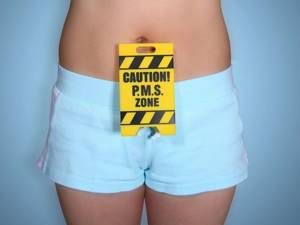
Menu (Power Mode)
The range of products is quite diverse, and the list of prohibited products is not long. In general, this is a healthy and rational diet that should be followed constantly to maintain weight at the same level. When creating a menu, monitor the total calorie content and its distribution.
Lunch should be the most plentiful, breakfast should account for 30% of the total diet, and dinner 20%, the rest is allocated for small snacks. If you are interested in losing weight, then carbohydrates (even complex ones should be consumed in the first half of the day, and dinner should consist only of vegetables and the protein component of the diet, fish, cottage cheese, eggs, chicken, etc.).
What are the dangers of heavy periods?
It can be assumed that you can put up with heavy periods - visit the ladies' room more often, take care of your hygiene, take painkillers, and after a week everything will pass. It is not right. Menorrhagia, sooner or later (after its completion or in the longer term) may respond with anemia, because the body loses too much blood. In addition, heavy menstruation itself can be a symptom of a serious gynecological or endocrine disease, to exclude which it would be useful to visit a gynecologist unscheduled.
- Menorrhagia is often a symptom of genetically determined diseases. Have your immediate female relatives been diagnosed with endometriosis or fibroids? Then do not neglect scheduled visits to your antenatal doctor, and take changes in the intensity and abundance of menstruation as an alarming signal. Along with them, spotting brown discharge is usually observed on the eve of menstruation or after sexual intercourse, and pain in the lower abdomen that continues after menstruation.
- Heavy periods with blood clots are closely related to a disorder such as iron deficiency anemia. Anemia develops with significant blood loss, which, in fact, is daily menstrual flow of over 80 grams. Experience in the treatment of anemia and menorrhagia shows that restoring the concentration of hemoglobin in the blood often helps normalize menstrual flow.
- As already noted, menorrhagia develops with a pathological structure of the endometrium of the uterus, and therefore it would be useful to conduct an ultrasound examination to make sure that menorrhagia is normal, but only if the ultrasound does not show pathological changes in the structure of the endometrium.
- A woman’s menstrual function is closely related to hormonal levels and metabolic processes in the body. If there are disturbances in one of these areas, both heavy and scanty periods may develop, and their duration and frequency will change. Sudden changes for no apparent reason should be responded to by contacting a specialized specialist.
- If heavy periods generally have a negative impact on your well-being, make changes to your normal routine, or are accompanied by other unpleasant and painful symptoms, do not delay visiting your doctor.
Reviews and results
The diet has optimal caloric content and a high content of vitamins; if a woman seems to find this not enough (especially in winter due to the lack of fruits and berries), then additional medications can be taken. Many note that the diet is difficult to tolerate due to the restriction of sweet foods, especially since the craving for them is increased. Some people are not satisfied with the consumption of dried fruits and sweet fruits, and for these reasons the diet is often interrupted.
- “... I have PMS, which is accompanied by irritability and swelling. 10 days before, I decided to go on a diet. Lost 2 kg. I try to stick to proper nutrition, but I am so drawn to sweets that I have no strength to resist. Often in the evening after work I break down - gingerbread and chocolate are used. Is it healthier to eat an apple or cottage cheese with dried fruits? But I can’t overcome myself. Apparently, you need to come to such nutrition gradually and make it a rule of life, then the lack of sweets will not be so hard to bear”;
- “... The weight gain these days is always 1.5 kg. It is clear that fluid is retained. On critical days, it is difficult to follow a diet, as the appetite wakes up brutally. I try to eat everything unsalted and it helps: my stomach shrinks, my cheeks fall in, and the ring doesn’t dig into my finger. I eat fish, meat, all vegetables, apples, low-fat cottage cheese and kefir. I don't eat fried or sweet foods. This diet helps with edema, but my pain still doesn’t go away—only pills help”;
- “... After fasting for the second month there are no periods. After the first visit, my periods were delayed for two months in a row, and after the second, they completely disappeared. Moreover, the weight did not decrease much - only 7 kg. I'm very upset that so much effort was put in and now it's starting to fail. I understand that if I start eating as usual, the kilograms will come back. So it turns out to be a vicious circle.”
Causes of heavy periods
The duration and intensity of menstrual flow are individual for each woman, and these two indicators are dictated by the concentration of the hormone estrogen in the blood. The secretion of estrogen determines how much the endometrium will develop in the uterus. During menstruation, the endometrium is shed, and its quantity determines the degree of menstrual flow.
Increased production of estrogen will affect the growth of the uterine endometrium, which means that menstruation will be abundant. Overproduction of estrogen may be associated with various thyroid pathologies.
Pathological development of the endometrium (depending on hormonal levels or other internal processes) is the second most common cause of heavy menstruation. Pathologies of the endometrium include the development of polyps in it, endometriosis, fibroids, and adenocarcinoma of the uterus. The presence of myomatous components in the structure of the uterus affects its contractile activity. The genetic factor is not the least important in the development of the above gynecological diseases.
Disruption of the blood clotting process, which occurs with thrombocytopenia, for example, as well as metabolic disorders are manifested, among other things, by menorrhagia.
Sometimes menorrhagia develops as a result of inappropriate contraception. We are talking in particular about the intrauterine device or oral contraceptives, the use of which entails hyperproduction of estrogen.
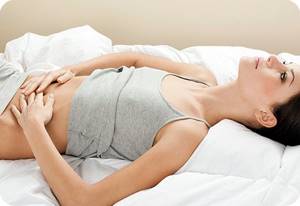
Women who are actively involved in sports should be aware that heavy discharge can be the result of heavy physical activity and rigorous exercise. A strict diet, chosen without taking into account the individual characteristics of the body, can cause the same reaction in the body. Other external influences, such as a reaction to inappropriate drug therapy or climate change, or a traumatic stress factor are also among the popular ones.
How to reduce your appetite
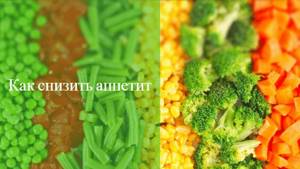
On critical days, a state when it is impossible to resist the desire to eat a lot of everything and, preferably, the most harmful ones, is known to most women. This feeling usually occurs due to hormonal imbalance. To help reduce appetite, doctors prescribe hormonal drugs to their patients in such cases.
But you can avoid taking pills if you eat strictly according to the regimen, in small portions, but often. It is also necessary to increase physical activity, which helps relieve the nervous system and restore its controlling role in the formation of hormonal levels.
To ensure that nutrition during menstruation is beneficial and reduces appetite, you need to stick to a vegetable diet rich in fiber. It is important to have foods with slow carbohydrates - whole grain cereals and bread and pasta containing them. Saturation with water is also necessary for the normal functioning of the nervous system. Therefore, between meals you should drink small amounts of clean water, excluding sweet and intestinal irritating drinks.
Eating large quantities of fatty, high-calorie foods will not only not reduce your appetite, but may even increase it. In addition, such nutrition will negatively affect the functioning of all body systems.
Why does your appetite increase?
On critical days, due to a hormonal surge, the hunger center is activated, increasing appetite. The body wants to eat, regardless of objective needs. And it doesn’t matter to him what you eat – salty or sweet, spicy or fatty. The main thing is to drown out this signal coming from the brain.
The opposite situation occurs much less frequently, but it can also happen. In this case, it is not the desire to eat a lot, but an abnormal aversion to food. This also negatively affects the functioning of the reproductive system and the condition of the body as a whole.
Therefore, on critical days you should not refuse food. You should also not overload your stomach with food. You need to eat properly and in portions, excluding what you cannot eat during menstruation. In this case, you can reduce your appetite and prevent the body from accumulating excess calories and fat deposits.


